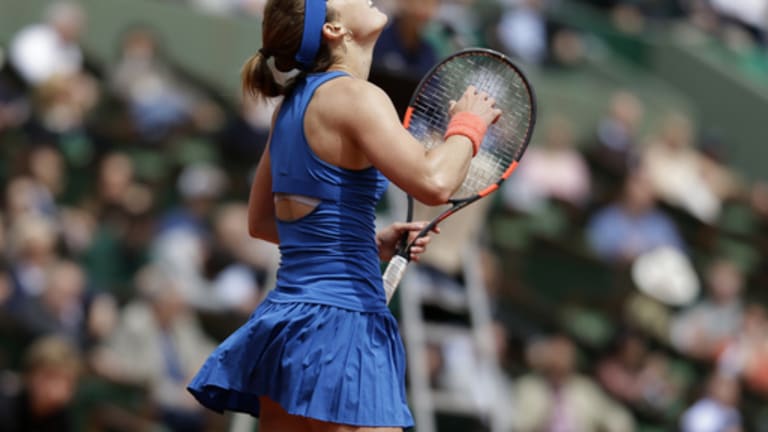In a sport awash in fist-pumps, how does a tennis player make one of hers stand out? How does she show the world that, this time, she really means it?
Alizé Cornet was faced with this question in her third-round match against Mirjana Lucic-Baroni on Friday. From the start, she had been giving her supporters in Court Philippe Chatrier a solid, standard single-fist pump after a winning point. At more important moments, she had celebrated by clenching both fists, bending at the waist, and letting out a stadium rattling “Allleeeezzzz!” Now it was deep into the third set, and she had just saved a break point with a brilliant, dipping pass. How was she going to up the fist-pump ante again? Cornet, like the consummate performer that she is, decided to pull back a little this time, for dramatic effect. She clenched her first, pumped it briefly, and then brought it to her chin and held it there, motionless, for a few long seconds as she closed her eyes.
The Frenchwoman was milking the moment, and the French crowd was happy to lap it up. They helped push the 25-year-old Nice native back from the brink of defeat, over the finish line, and into the fourth round with a 4-6, 6-3, 7-5 win over Lucic-Baroni. It’s been five years since the audience here watched one of its own, Marion Bartoli, go deep into the women's draw at Roland Garros, and as the week began, it seemed unlikely that this streak of futility on the WTA side was going to end anytime soon.
Caroline Garcia, France’s No. 2-ranked woman behind Cornet, was upset in the first round, and afterward she talked about how much she hated playing in front of her compatriots in the big stadium at Roland Garros. It has been a theme among French players for years; the Parisian audience can smother them in expectations and emotion. But for now, Cornet, with her enthusiastic embrace of the stage and the moment—does it surprise you that her tennis-playing hero is Andy Roddick?—has made all of that sound like ancient history.
“The crowd was amazing once more today,” said Cornet, who, despite the fan support, had never been past the third round here. “They really helped me get through the tough times on the court. Mirjana was playing really aggressively, and I had to play with all my heart, and the crowd behind me like that was giving me energy to keep going and not let go.”
“I owe them a lot today, because I think I went over my limits.”
